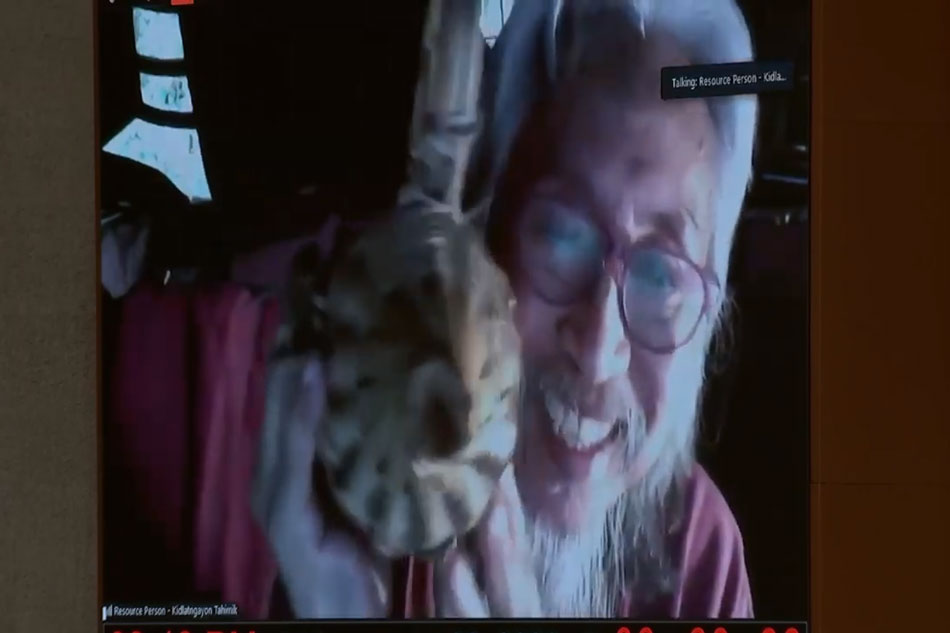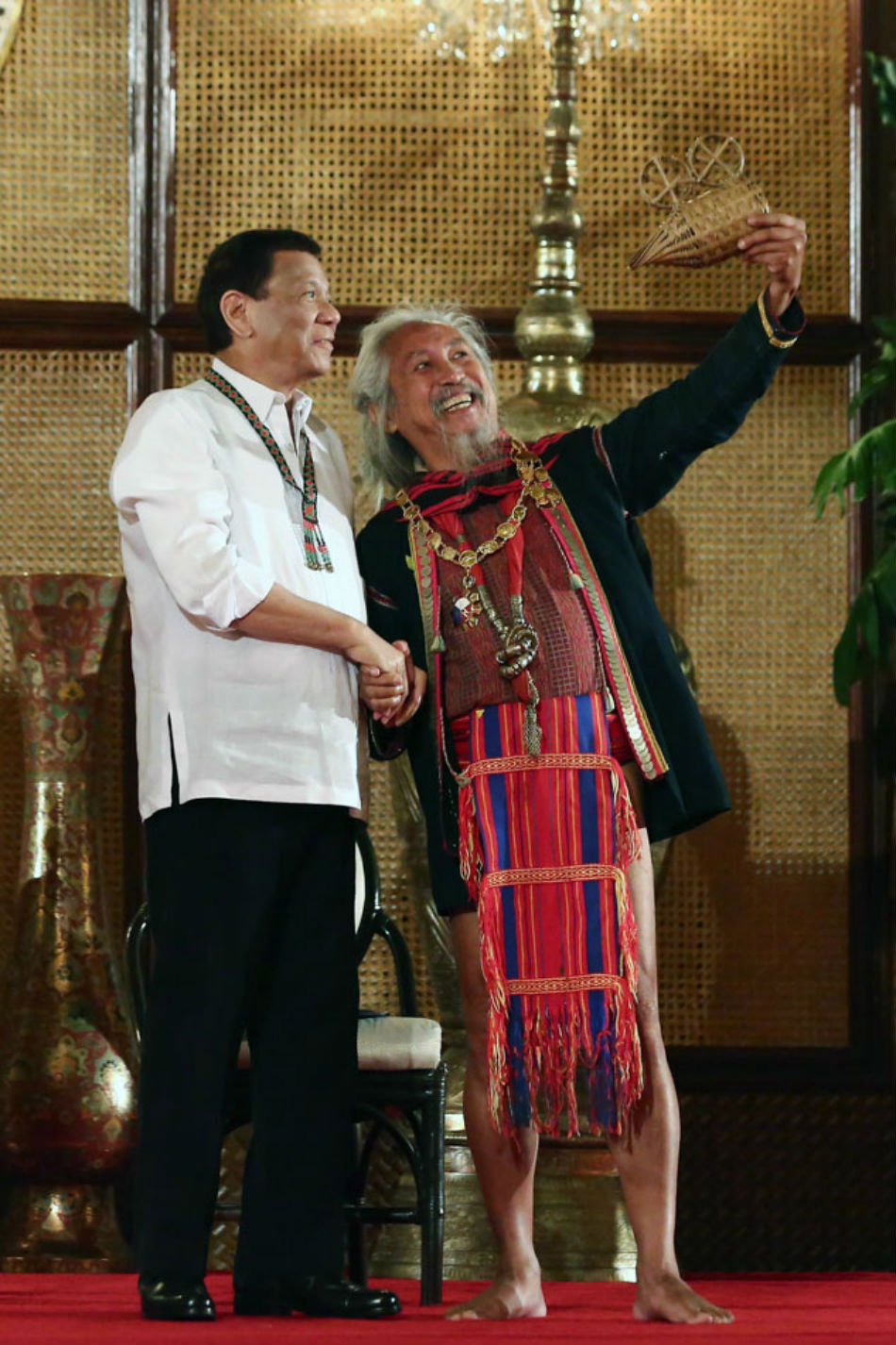Use your 'bamboo camera': Kidlat Tahimik urges all networks to combat 'bias' vs own culture
ADVERTISEMENT

Welcome, Kapamilya! We use cookies to improve your browsing experience. Continuing to use this site means you agree to our use of cookies. Tell me more!
Use your 'bamboo camera': Kidlat Tahimik urges all networks to combat 'bias' vs own culture
Miguel Dumaual,
ABS-CBN News
Published Jul 06, 2020 08:48 PM PHT
|
Updated Jul 07, 2020 02:41 AM PHT
MANILA — Use your "bamboo camera," Kidlat Tahimik urged all broadcast networks in the Philippines on Monday, as he spoke at a House hearing on the franchise renewal of ABS-CBN.
MANILA — Use your "bamboo camera," Kidlat Tahimik urged all broadcast networks in the Philippines on Monday, as he spoke at a House hearing on the franchise renewal of ABS-CBN.
The National Artist for Film and Broadcast Arts, one of the resource speakers, opened by clarifying he neither sought to defend nor back ABS-CBN's broadcast restoration, but to "aid legislation, for better franchises in the future."
The National Artist for Film and Broadcast Arts, one of the resource speakers, opened by clarifying he neither sought to defend nor back ABS-CBN's broadcast restoration, but to "aid legislation, for better franchises in the future."
He noted that in previous hearings, issues tackled were the likes of Philippine Depositary Receipts, labor practices, and technicalities of broadcast frequencies. Culture, Kidlat pointed out, has so far been sidelined.
He noted that in previous hearings, issues tackled were the likes of Philippine Depositary Receipts, labor practices, and technicalities of broadcast frequencies. Culture, Kidlat pointed out, has so far been sidelined.
"Bakit kaya walang cultural component na pinag-uusapan? Sa akin, bilang cultural worker, I think it's important na isama itong ingredient ng kultura ng Pilipino, and the responsibilities of the broadcast industry to our culture," he said.
"Bakit kaya walang cultural component na pinag-uusapan? Sa akin, bilang cultural worker, I think it's important na isama itong ingredient ng kultura ng Pilipino, and the responsibilities of the broadcast industry to our culture," he said.
ADVERTISEMENT
Kidlat raised the possibility of including the cultural programming as a factor in franchise approvals of broadcast entities in general.
Kidlat raised the possibility of including the cultural programming as a factor in franchise approvals of broadcast entities in general.
Anticipating criticisms that such measure would be seen as a form of censorship, Kidlat said he merely calls for "balance," in light of "commercial considerations" being the foremost factor in production of programs.
Anticipating criticisms that such measure would be seen as a form of censorship, Kidlat said he merely calls for "balance," in light of "commercial considerations" being the foremost factor in production of programs.
Kidlat, regarded as the "Father of Independent Philippine Cinema," explained that the country's broadcast landscape has long been commercial, as opposed to autonomous like the UK's BBC, or state-controlled.
Kidlat, regarded as the "Father of Independent Philippine Cinema," explained that the country's broadcast landscape has long been commercial, as opposed to autonomous like the UK's BBC, or state-controlled.
While commercial broadcast is freer, it also tends to sideline cultural relevance, or worse, be culturally insensitive, because no cultural criteria are in place, according to Kidlat.
While commercial broadcast is freer, it also tends to sideline cultural relevance, or worse, be culturally insensitive, because no cultural criteria are in place, according to Kidlat.
He mentioned, as examples, a '90s sitcom where an actress' line attributed being "ugly" to being a child of an Igorot, and the casting of Marian Rivera, a half-Spanish actress with fair complexion, in the titular role of the period drama "Amaya."
He mentioned, as examples, a '90s sitcom where an actress' line attributed being "ugly" to being a child of an Igorot, and the casting of Marian Rivera, a half-Spanish actress with fair complexion, in the titular role of the period drama "Amaya."
ADVERTISEMENT
"What is the subliminal message of that to all our kayumanggi Filipinas when they see that kailangan palaging 'yung pinakabida is somebody who is like them?" he asked.
"What is the subliminal message of that to all our kayumanggi Filipinas when they see that kailangan palaging 'yung pinakabida is somebody who is like them?" he asked.
The goal, Kidlat said, is to achieve a balance between the "bias" for commercial viability and content that is rooted in Filipino culture.
The goal, Kidlat said, is to achieve a balance between the "bias" for commercial viability and content that is rooted in Filipino culture.
"I'm not saying that all programs dapat may ballet dito, may konsiyerto diyan, o may T'boli weaving. We're not talking about that. Let's face it: ad revenues create a certain direction in the kind of programming that is fed to our people," he said.
"I'm not saying that all programs dapat may ballet dito, may konsiyerto diyan, o may T'boli weaving. We're not talking about that. Let's face it: ad revenues create a certain direction in the kind of programming that is fed to our people," he said.
"And I think sometimes that competition between networks, nagiging obsessive sila sa Nielsen ratings nila. Because of this, mas nagiging importante 'yung patok, that the show is going to keep grabbing the audience, and therefore the ratings will convince the advertisers to keep putting in."
"And I think sometimes that competition between networks, nagiging obsessive sila sa Nielsen ratings nila. Because of this, mas nagiging importante 'yung patok, that the show is going to keep grabbing the audience, and therefore the ratings will convince the advertisers to keep putting in."
Kidlat then addressed a question to ABS-CBN, as well as its closest competitors GMA-7 and TV5, paraphrasing Newton Minow, former chair of the United States' Federal Communications Commission.
Kidlat then addressed a question to ABS-CBN, as well as its closest competitors GMA-7 and TV5, paraphrasing Newton Minow, former chair of the United States' Federal Communications Commission.
ADVERTISEMENT
"Out of 73 hours of evening primetime and 59 hours of action, situation comedy, quiz shows, and movies, is there no room on primetime TV to enrich and uplift audiences, to enlarge the capacities of our children?"
"Out of 73 hours of evening primetime and 59 hours of action, situation comedy, quiz shows, and movies, is there no room on primetime TV to enrich and uplift audiences, to enlarge the capacities of our children?"
"The public is your beneficiary," Kidlat went on to quote Minow. "If you want to stay as trustees, you must deliver a decent return to your public, not only to your shareholders."
"The public is your beneficiary," Kidlat went on to quote Minow. "If you want to stay as trustees, you must deliver a decent return to your public, not only to your shareholders."
Kidlat explained the concept of frequencies, as he reminded networks that broadcasting is a "privilege given by the government."
Kidlat explained the concept of frequencies, as he reminded networks that broadcasting is a "privilege given by the government."
"If the government is giving them the franchise, parang naging trustees sila of the common good. This is the concept of the network that maybe sometimes is forgotten, na mayroon kayong malalim na responsibilidad, which has to be followed," he said.
"If the government is giving them the franchise, parang naging trustees sila of the common good. This is the concept of the network that maybe sometimes is forgotten, na mayroon kayong malalim na responsibilidad, which has to be followed," he said.
Kidlat suggested the possibility forming an agency — separate from the National Commission for Culture and the Arts, and the Movie and Television Review and Classification Board — that would specifically address cultural programming or content in television and films.
Kidlat suggested the possibility forming an agency — separate from the National Commission for Culture and the Arts, and the Movie and Television Review and Classification Board — that would specifically address cultural programming or content in television and films.
ADVERTISEMENT
Or, Kidlat hopes, networks can simply be more proactive in using their own "bamboo camera," eliminating the need for an intervening agency.
Or, Kidlat hopes, networks can simply be more proactive in using their own "bamboo camera," eliminating the need for an intervening agency.
Kidlat carried his — bamboo sticks twisted and tied into the shape of a camera — as he appeared at the hearing via video call.
Kidlat carried his — bamboo sticks twisted and tied into the shape of a camera — as he appeared at the hearing via video call.
When he was formally named National Artist in 2018, Kidlat used the object to take a "selfie" with President Rodrigo Duterte.
When he was formally named National Artist in 2018, Kidlat used the object to take a "selfie" with President Rodrigo Duterte.
"It's a symbol of telling the local story, with the local POV (point of view). Unless we tell our stories with our culture filters, we will just remain copycats of foreign programming because kikita," he said.
"It's a symbol of telling the local story, with the local POV (point of view). Unless we tell our stories with our culture filters, we will just remain copycats of foreign programming because kikita," he said.
Kidlat, born Eric de Guia, has long advocated for cultivating local filmmaking that's truly independent of Western influences. Achieving that entails forgoing of what he termed as the "PST" (patok sa takilya) formula, which, itself, had been determined by the pervasiveness of passed-on culture from decades of colonial rule, he said.
Kidlat, born Eric de Guia, has long advocated for cultivating local filmmaking that's truly independent of Western influences. Achieving that entails forgoing of what he termed as the "PST" (patok sa takilya) formula, which, itself, had been determined by the pervasiveness of passed-on culture from decades of colonial rule, he said.
ADVERTISEMENT
"Ang biktima dito is going to be the Filipino people. Please remember this visual: It's a symbol of letting networks serve the Filipino people in a much deeper way. I'm hoping one day I can give [this as] an award to one network which probably has met the criteria of serving, or having programming content that is really, tumatama sa kaloob-looban ng Pilipino."
"Ang biktima dito is going to be the Filipino people. Please remember this visual: It's a symbol of letting networks serve the Filipino people in a much deeper way. I'm hoping one day I can give [this as] an award to one network which probably has met the criteria of serving, or having programming content that is really, tumatama sa kaloob-looban ng Pilipino."
Kidlat surmised that it may be beneficial to the industry that a high-profile hearing on a broadcast franchise is happening amid a pause in showbiz productions, due to the coronavirus pandemic.
Kidlat surmised that it may be beneficial to the industry that a high-profile hearing on a broadcast franchise is happening amid a pause in showbiz productions, due to the coronavirus pandemic.
"We cannot go on like this forever. Everybody says post-COVID, we cannot go back to normal, we cannot back to what it was before. Maybe it's a blessing that your hearing is during this COVID times, because meron tayong mahahanap na puwede i-improve, puwede pang pagbutihan, para ang ating television industry will truly be in the service of the Filipino — and the Filipino culture."
"We cannot go on like this forever. Everybody says post-COVID, we cannot go back to normal, we cannot back to what it was before. Maybe it's a blessing that your hearing is during this COVID times, because meron tayong mahahanap na puwede i-improve, puwede pang pagbutihan, para ang ating television industry will truly be in the service of the Filipino — and the Filipino culture."
ADVERTISEMENT
ADVERTISEMENT




